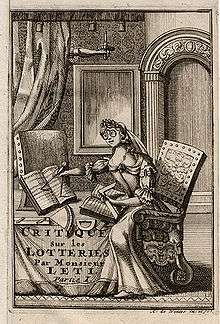Gregorio Leti



Gregorio Leti (1630–1701) was an Italian historian and satirist from Milan, who sometimes published under the pseudonym Abbe Gualdi, L'abbé Gualdi,[1] or Gualdus[2] known for his works about the Catholic Church, especially the papacy. All of his publications were listed on the Index Librorum Prohibitorum.[3]
Life
The nephew of the Bishop of Acquapendente in Umbria, Leti was educated in a Jesuit school, but later became a Protestant.[4] He resided in the court of Louis XIV of France and in 1680[5] that of Charles II of England, who commissioned him to write a history of England. Leti had access to the library of the Earl of Anglesey, which numbered over 5,000 volumes, as well as that of Bishop Gilbert Burnet.[6] He wrote the first ever proper life of Elizabeth I of England, which includes many romantic embellishments about her youth and her mother, Anne Boleyn. Nevertheless, he may have used documents he found in the English libraries.[7] Leti was also elected a member of the Royal Society.
After the publication of a collection of anecdotes which offended Charles II, Il Teatro Britannico,[8] Leti fled England in 1683 for Amsterdam, where he became the city historiographer in 1685.[9][10] He died in Amsterdam in 1701.[8]
Leti's biography of Pope Sixtus V has been translated into many languages, and contains an anecdote similar to the infamous "pound of flesh" from William Shakespeare's The Merchant of Venice.[11] The Catholic Encyclopedia calls Leti "mendacious and inexact" and is also critical of works described as derivative of Leti's "anti-papal histories."[12] Mosheim, a Lutheran church historian, called Leti "inaccurate and unfaithful."[13] According to Thomas Trollope, "his inexactitude as an historian is notorious."[14] Even secular writers have characterised his biography of Sixtus V as "resting on very slight authority."[15] Among his critics, Leti is sometimes referred to as the "Varillas of Italy."[5]
Leti was the father-in-law of the scholar and theologian Jean Leclerc.[10]
Works
- 1666. Histoire de Donna Olimpia Maldachini.
- 1667. Il Nipotismo di Roma, o vero relatione delle ragioni che muovono i Pontefici all' aggrandimento de' Nipoti ("Papal Nepotism, or the True Relation of the Reasons Which Impel the Popes to make their Nephews Powerful"[3])
- 1668. Il Cardinalissimo di Santa Chiesa.
- 1668 Il Pvttanisno Romano, à Vero, Conclave Generale delle Puttane della Corte From the Collections at the Library of Congress
- 1671. Le visioni politiche sopra gli interessi più reconditi di tutti i principi e repubbliche della Cristianità.
- 1682. La Vita della Regina Elizabetta.
- 1685. L'histoire de la vie du Pape Sixte Cinquième.
- 1685. Il ceremoniale historico e politico, opera utilissima a tutti gli Ambasciatori.
- 1686. Historia Genevrena.
- 1693. Historia overo Vita di Elisabetta, Regina d'Inghilterra.
- 1697. Critique historique, politique, morale, économique, & comique sur les lotteries.
Further reading
- Krivatsy, Nati. 1982. Bibliography of the Works of Gregorio Leti. Oak Knoll Books New Castle. 8 vols.
References
- ↑ Jewett, Charles Coffin. On the Construction of Catalogues of Libraries, and their Publication by Means of Separate Stereotyped titles. ISBN 1-4021-7529-9. p. 78.
- ↑
 Herbermann, Charles, ed. (1913). "Pope Innocent X". Catholic Encyclopedia. New York: Robert Appleton Company.
Herbermann, Charles, ed. (1913). "Pope Innocent X". Catholic Encyclopedia. New York: Robert Appleton Company. - 1 2 Ambrosini, Maria Luisa, and Willis, Mary. 1996. The Secret Archives of the Vatican. Barnes & Noble Publishing. ISBN 0-7607-0125-3. p. 138.
- ↑ Israel, Jonathan Irvine. 1991. The Anglo-Dutch Moment: Essays on the Glorious Revolution and Its World Impact. Cambridge University Press. ISBN 0-521-54406-8. p. 32.
- 1 2 Thomas, William John. 1860. Notes and Queries. G. Bell. p. 270.
- ↑ Mayer, Thomas Frederick. 1999. A Reluctant Author: Cardinal Pole and His Manuscripts. ISBN 0-87169-894-3. p. 107.
- ↑ Chamberlin, Frederick: Elizabeth and Leycester, Dodd, Mead & Co., 1939, pp. 91, 439–440
- 1 2 Dublin University Magazine. 1852. "Anecdotes of the Stage." in Eclectic Magazine edited by Walter Hilliard Bidwell and John Holmes Agnew. Leavitt, Throw and Co. p. 182.
- ↑ Granger, James. 1824. A Biographical History of England. W. Baynes and Son. p. 45.
- 1 2 Marshall, John. 2006. John Locke, Toleration and Early Enlightenment Culture. Cambridge University Press. ISBN 0-521-65114-X. p. 177.
- ↑ Solomon A. 1998. "Shakespeare and the Jews." Renaissance Quarterly. 51, 1.
- ↑
 Herbermann, Charles, ed. (1913). "Conclave". Catholic Encyclopedia. New York: Robert Appleton Company.
Herbermann, Charles, ed. (1913). "Conclave". Catholic Encyclopedia. New York: Robert Appleton Company. - ↑ Mosheim, Johann Lorenz, and Maclainep, Archibald. 1819. An Ecclesiastical History, Ancient and Modern, from the Birth of Christ, to the Beginning of the Eighteenth Century. p. 194.
- ↑ Trollope, Thomas Adolphus. 1876. The Papal Conclaves, as They Were and as They are. Chapman and Hall. p. 106.
- ↑ Clark, William George, and Wright, William Aldis. 1874. Introduction to The Merchant of Venice. Clarendon Press. p. xx.